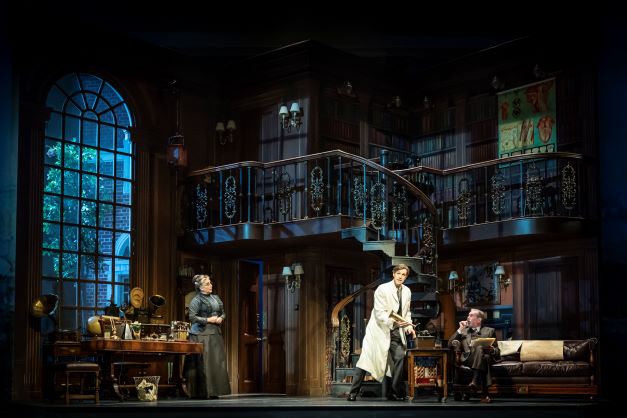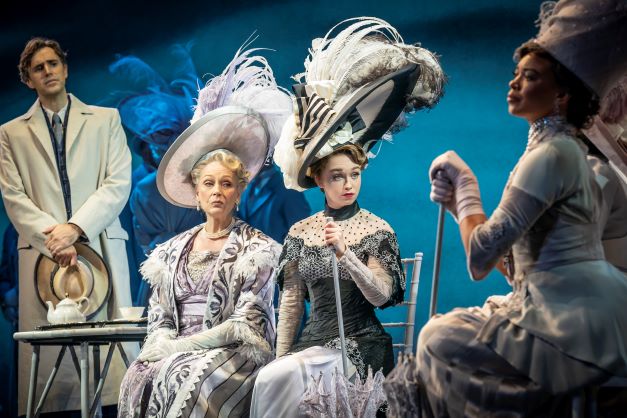
15 – 25 February
‘Wouldn’t it be Loverly?’ goes the song. And so it proved last night in this sparkling and dynamically realised revival of Lerner & Loewe’s smash hit of the mid 1950’s, on tour through the UK and Ireland after a successful run in the West End. You just cannot keep a good song down it seems – at least seven of the show’s numbers have lost none of their magic over seven decades.
Derived and adapted from George Bernard Shaw’s play Pygmalion, My Fair Lady is the story of a poor cockney girl, Eliza Doolittle, who sells flowers in Covent Garden before being plucked from obscurity by a professor of phonetics, Henry Higgins, who treats her as his personal project. Set in an Edwardian period mired in patriarchy, the self-serving Higgins takes on a bet from a fellow linguist that he can transform the urchin Doolittle into a lady by schooling her to speak the ‘Queen’s English’. While proclaiming male pre-eminence, (yes, that aspect of the play creaks) he underestimates Eliza’s pride and the affection that begins to grow between them.
The play, which originally opened on Broadway in 1956, became a smash hit and ran till 1962, when it closed after 2,717 performances, a record at the time. Rex Harrison as Professor Higgins, and Julie Andrews as flower girl Eliza were among the original stage stars of the show. Harrison was again cast as Higgins for the 1964 film version of the show which went on to win eight Oscars with Audrey Hepburn starring as Doolittle. While the recording of the show became the must-have album for baby boomers’ parents, the tunes and lyrics still retain their great charm: With a Little Bit of Luck; The Rain in Spain; I could Have Danced All Night; On the Street Where You Live; Get Me to the Church on Time; I’ve Grown Accustomed to her Face and of course, Wouldn’t it be Loverly? being the evergreen stand-outs.
Big shoes to fill then. But tonight’s cast was more than up to the task, led in exemplary style by an animated Michael D Xavier as the self-obsessed Professor Higgins, and a feisty performance by Charlotte Kennedy as the phonetician’s human experiment. John Middleton played a characterful second fiddle to Xavier as the kindlier Colonel Pickering, imploring his fellow linguist to mollify his attitudes and language towards his vulnerable charge. Adam Woodyatt seemed the perfect fit for his role as Eliza’s dustman dad, Alfred Doolittle – an opportunist rogue who stumbles into higher station thanks to his daughter’s new connections. At the climax of one ecstatic dance routine (I’m Getting married in the Morning), in which he debauches himself with booze and ‘loose women’ before catching a posy of white flowers tossed to him while atop a table, Woodyatt inspired a delirious ovation from the audience.
Xavier’s Higgins felt at times as if modelled on John Cleese’s Basil Faulty, a man constantly confounded by the opposite sex while misguidedly blinded by his belief in his own superiority. Charlotte Kennedy’s strong soprano always commanded the stage, while there was strong support from Tom Liggins as Freddie, Eliza’s wannabe lover, and Lesley Garrett as Higgins’ house keeper.
Set designer Michael Yeargan can feel justly proud of his construction of the exterior of the Covent Garden Opera house, an East End pub that turns inside out, an embassy ballroom classily decked with a peacock-themed backdrop and most impressively, a lavish crafting of the professor’s home, which rotated to reveal smaller anti-rooms and a hallway.
With loving attention to detail, Catherine Zuber’s costumes held to an Edwardian theme, especially the aristocratic finery on display for the Ascot races enclosure scene.
Marc Salzberg’s sound was always on point and sometimes wittily creative, such as the thundering hooves of racehorses seeming to pound around the perimeter of the auditorium. Donald Holder’s lighting added great atmosphere to the piece, whether adding dusk notes over the edifice of the opera house, starker bright white illumination over the racegoers or warmer tones to the interior of Higgin’s home.
With Bartlett Sher’s energetic direction backed by the lively nine-piece My Fair Lady Orchestra, conducted by Alex Parker, this was a spectacle that never ceased to entertain despite the length of the production, at just under three hours in length.
★★★★☆ Simon Bishop 17 February 2023
Photo credit: Marc Brenner


